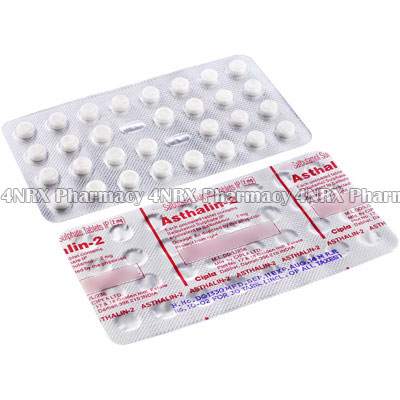 |
Home  Asthma Asthma  Asthalin (Salbutamol) Asthalin (Salbutamol) |
|
|||||||||
|
|
Asthalin (Salbutamol)
What is Asthalin (Salbutamol) used for? Asthalin (Salbutamol) is a short acting beta 2 agonist prescribed to treat patients suffering from asthma or chronic obstructive pulmonary disease (COPD). It operates by reducing inflammation in the airways to allow easier and more comfortable respiration. It may also be useful for halting uncomplicated premature labor. Your physician may prescribe it to treat other unlisted conditions, as well. How should I use Asthalin (Salbutamol)? Strictly follow the instructions provided by your physician while using Asthalin (Salbutamol) to ensure the most effective results. One tablet is typically administered one to three times each day, but your particular instructions will differ depending on the condition being treated and the severity of your symptoms. The doses should be swallowed with a large glass of water and can be taken with or without food, but a meal or snack is recommended before use if you experience nausea. Never split, crush, or chew the tablets prior to use as this may destroy or alter the effects of their contents. Ask your physician any questions you have about the medication to ensure the correct application. What are the side effects of Asthalin (Salbutamol)? Side effects that may occur while using Asthalin (Salbutamol) include:
Also inform your physician if you experience more serious side effects that may require medical assistance such as tremors, irregular heartbeat, muscle cramps, or pulmonary edema. Tell your physician about any symptoms that become severe or worrying to you to ensure the correct adjustments are made to your treatment to prevent further problems from occurring. Please Note Before using Asthalin (Salbutamol), be sure to inform your physician if you have heart disease, diabetes, hyperthyroidism, hypertension, or arrhythmias as these conditions may cause unexpected complications during treatment. Strictly follow all instructions provided to you by your physician or pharmacist while using Asthalin (Salbutamol). Optimum and safe dosage can differ based on the patient and the condition being treated. As this medication may be unsafe for certain patients, it is essential you always inform your physician if you are pregnant or breastfeeding, as well as if you have any allergies, other illnesses, or ongoing health conditions, and if you are taking any other form of medication, supplements, or herbal products. Immediately seek emergency medical care if you have an allergic or hypersensitive reaction. Common signs of a reaction include hives, swelling, skin rashes, chest pains, as well as trouble breathing or swallowing. 
|
||||||||||||||||||||||